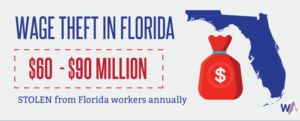 Pinellas County has the dubious honor of being the fourth worst county in the state in terms of wage theft. In spite of some local and county government efforts to stem the tide, Pinellas County remains a problem area for employee wage theft. Florida’s key industries have the highest numbers of reported wage violations—tourism, retail trade and construction.
Pinellas County has the dubious honor of being the fourth worst county in the state in terms of wage theft. In spite of some local and county government efforts to stem the tide, Pinellas County remains a problem area for employee wage theft. Florida’s key industries have the highest numbers of reported wage violations—tourism, retail trade and construction.
While federal laws such as the Fair Labor Standards Act (FLSA), Agricultural Worker Protection Act, the Davis-Bacon Act and others were enacted in order to protect workers, they all contain exemptions that exclude millions of workers in the U.S. from wage and hour protections. Since the majority of wage theft takes place with workers in Florida’s service sector, there are no employment contracts to which an employer can be held liable for breach of contract.
However, there are a number of ways I can help you with a wage theft claim. First, it’s important to recognize the most common ways wages are stolen from workers here in Florida. The following are a few examples:
1)Classifying you as an exempt employee. The distinction between exempt and non-exempt is defined by the federal government and not your employer. Federal guidelines have to be met in order to classify you as exempt (you aren’t covered by overtime laws if you work more than 40 hours a week). If you are considered an exempt employee but are performing work that requires supervision and direction and you are not supervising others, your employer may be cheating you out of overtime pay.
2)Classifying you as an independent contractor. Much like the exempt-nonexempt distinction, an employer does not have the right to consider you an independent contractor unless the work performed and your role in the company makes you an independent contractor by law. Some employers will even tell their workers that independent contractor status will save the worker money since taxes are taken out of a paycheck. However, this is not true and you are still liable for taxes. Most importantly, independent contractor status is governed by federal law.
3)Employer fails to pay you a minimum wage. Despite federal and state laws, some employees are often cheated out of the minimum wage. Day-rate workers and tipped employees are particularly susceptible to minimum wage violations because of how they are paid.
Finally, you may be a victim of wage theft if your employer doesn’t pay you while you are preparing for work but not on the work premises. Examples of such are:
- Checking emails from home
- On-call
- Turning on computers
- Cleaning equipment
- Putting on equipment
- Undergoing security checks
- Working through meal breaks
- Attending training or safety classes
- Taking short breaks that last between 5 and 20 minutes
Wage theft hurts all of us. It’s bad for Florida’s economy and provides workers a strong disincentive to do their best work. If you or a loved one think they may be a victim of wage theft, call me today for a free consultation.
